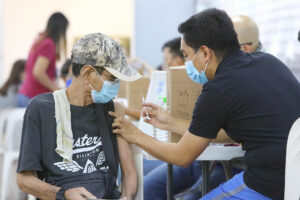PHL in 2022: Need for a new social contract

Why we need a new social contract in the Philippines should not be trick question. True, in theory, it could be as fundamental as reiterating that the people are the only source of government power, that the people can withhold granting such power to the government because they have the ability to do so. To what extent should the people exercise their individual rights as to constitute popular sovereignty rounds out the conversation.
These premises rationalize the role of government in protecting the people and in promoting their well-being. If the government, for any reason, fails to uphold the rule of law and frustrates the cause of truth and justice, freedom and equality, love and peace, the people can exercise their power within the bounds of the law to ensure that our ideals and aspirations in the Philippine Constitution are always upheld.
However, rewriting the social contract is now imperative because of the sea changes in the policy environment. With the so-called pandemic of disinformation, for instance, it is necessary to define the rights and obligations of Filipinos in seeking the truth as the basis of both state policy and action, and their own defense against the opposite of truth. Digitalization of business activities also ought to lead to a rethink of social obligations and the government’s role in delivering public goods. Moreover, corruption involving public money has become an enduring culture, now more pronounced in a time of pandemic and a spate of natural calamities.
Precisely three years ago, the International Monetary Fund (IMF) and the London School of Economics (LSE) jointly sponsored a workshop on “Social Protection in a Changing World.” The Fund was looking into strategic ways of shaping more relevant social spending in member countries. LSE had decided to prioritize its research on welfare provision. The nexus between the two institutions and their goals could not be clearer. Social spending is crucial in promoting more inclusive and sustainable economic growth and financial stability. In the workshop, the issue was immediately elevated to one of rewriting the social contract by LSE’s director Minouche Shafik by pointing out that while social safety nets have been beneficial, constraints on public spending, high levels of inequality, economic slowdown, and fears about the rapid technological change have exacerbated social discontent, leading to the rise of populism.
What Shafik proposed was that the new social contract should reinstate reciprocity and insurance elements of a social safety net, mitigate any imbalance in labor and capital taxation, consider “predistribution” measures like wage floors, investments in education and health, enhance social mobility and more effective rollout of infrastructure.
World Bank’s Michal Rutkowski, Harvard’s Jeni Klugman, and LSE’s Nick Barr and Ian Gough made an interesting point about the contemporary aspect of climate change. “Climate change, and climate-induced migration introduce new requirements for policies to be not just economically but also environmentally sustainable, and highlighted new needs for protection.” This would also warrant a rethink of the social contract.
In the Fund’s Finance and Development of December 2018, Shafik discussed anew the need for a new social contract. People are unhappy because of inequality, aggravated by the concern about the consequences of automation and population aging. Inequality was observed to have improved among countries but worsened within those countries. It was correct for Shafik to argue that while globalization and technology have their own share of blame, the greater blame should be on the failure of the social contract, and we suggest on the political leaders, too, “to manage properly the consequences of both.”
Thus were protectionism and anti-immigration sentiment born. But as Shafik reasoned, “the answer is not to deglobalize and revert to our national silos, but to rethink our social contract to heal these tensions and help people adjust.” What made matters worse is the coincidence of globalization, the financial crisis of 2008 and the ensuing financial squeeze that brought about poverty, inequality with a weak social safety net as mitigant. This would explain how a Donald Trump could win in the polls, or perhaps populist strong men becoming electoral darlings despite a slide to authoritarianism.
This is the global context of a possible rewriting of the social contract in nation states.
Going back to the Philippines, it would therefore be ideal for the new leader to announce the proposal to develop and implement a new social contract that would be explicit, for instance, in how workers displaced by modern technology and automation would be assisted by the government. The social contract should also ensure that the interest of special groups is promoted in the face of recent economic and social developments. We have a law giving some benefits to senior citizens, but we need a more systematic articulation of how the state intends to provide healthcare to them, even in providing health insurance and other pre-need coverage. A social contract mitigates marginalization in society.
Inequality is another challenge to a new social contract. Pre-distribution policies are definitely game changers. Good education, increased social mobility, and infrastructure development all lead to more robust economic growth. Quality education over time benefits from high payoff and inspire confidence in the future of the system. More flexible movement of people enabled by a good transport network and spatial location of firms allows better job matching and higher productivity. Infrastructure supports more sustainable growth in the future.
It is imperative to correct structural rigidities like the lack of flexibility in hiring and firing workers as the economy undergoes changes. This would have to be matched by generous unemployment benefits, training, and job placement. Shafik quoted a Danish practice of “flexicurity.” Firms pay higher taxes with a compensatory flexibility in labor practices.
In reconstructing the social contract, the people’s buy-in is key.
Who can argue against the cause of meaningful electoral reforms so that the will of the people may be freely expressed through the ballot? The social contract should redefine and address any new impediment to this cause.
Who can argue against the rule of law in people’s affairs in relation to any agency of their government? What other kind of recourse do the people have when the Constitution and the system of laws are transgressed openly?
Who can argue against the cause of upholding the country’s sovereignty as a nation? How else do we preserve our democratic rights as a nation if we allow aliens to eat into our own territories?
Who can argue against strengthening our public health system and quality education as we chart our destiny into the new year, and beyond? The pandemic has more than demonstrated the weaknesses of both institutions and government neglect even as they are both guaranteed by the Constitution.
Who can argue against promoting sustainable and inclusive economic growth that empowers even the marginalized sector to participate in business activities to help build the nation? Alienation and social strife develop when economic growth is not only feeble but also exclusivist.
Who can argue against strengthening communities that are resilient to both a health pandemic and climate change? It is not enough to subject health and climate issues to public discourse, they should be funded, and funded well.
A new year is like a new wineskin ready to accommodate a new wine of pure energy and new visions, and the past year is good only for remembering the tragedies we should avoid and the gains we should fight for.
The Lord will bless us and keep us all in 2022, and beyond!
Diwa C. Guinigundo is the former deputy governor for the Monetary and Economics Sector, the Bangko Sentral ng Pilipinas (BSP). He served the BSP for 41 years. In 2001-2003, he was alternate executive director at the International Monetary Fund in Washington, DC. He is the senior pastor of the Fullness of Christ International Ministries in Mandaluyong.




